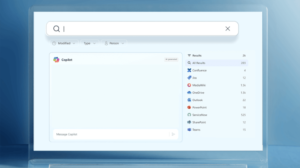Microsoft Security VP Discusses the Transition to Agentic AI in Security Copilot

Microsoft Expands Its Cybersecurity Solutions with New AI Agents
Introduction of Security Copilot and AI Agents
Microsoft has embarked on an exciting journey in the realm of cybersecurity with the introduction of Security Copilot, an AI-powered assistant aimed at aiding cybersecurity professionals. Just a year after its launch, Microsoft has unveiled six new specialized AI agents, integrating these tools across its product suite. Available for preview as of April 2024, these agents are designed to assist security teams in a variety of vital tasks.
Key Functions of the New AI Agents
The AI agents will help in several critical areas:
- Phishing and Security Alert Triage: Sorting through security alerts and identifying actual threats from benign alerts.
- Conditional Access Monitoring: Ensuring that users have appropriate access rights.
- Vulnerability Monitoring and Prioritization: Identifying security vulnerabilities and determining which should be addressed first.
- Threat Intelligence Curation: Collecting and customizing intelligence relevant to an organization’s unique challenges.
In addition to Microsoft’s own agents, five others from reputable partners—OneTrust, Aviatrix, BlueVoyant, Tanium, and Fletch—will also be available within Security Copilot.
The Need for AI Agents in Cybersecurity
Vasu Jakkal, Corporate Vice President of Microsoft Security, elaborated on the reasoning behind the integration of AI agents. The drive for this innovation stemmed from three primary challenges facing cybersecurity today:
Overwhelming Threat Landscape: Cybersecurity professionals are inundated with threats, facing approximately 7,000 password attacks per second. Furthermore, attacks are maturing swiftly; attackers now average just 72 minutes from a phishing click to data access.
Data Security Concerns: A recent survey indicated that 80% of organizational leaders using AI view data security as a top risk, with a significant number concerned about insider threats.
- Operational Complexity: The rapid growth of security tools has led to fragmentation, making it difficult for organizations to integrate them effectively. There is also a considerable talent shortage in the cybersecurity sector.
What Makes an AI Agent?
When discussing what differentiates an AI agent from traditional AI tools, three essential attributes were highlighted:
- Autonomy: AI agents operate with a higher level of independence compared to traditional automation tools.
- Reasoning: These agents can analyze data and make informed inferences.
- Learning Capabilities: AI agents adapt and learn from user inputs, enhancing their effectiveness over time.
Overview of the Six New AI Agents
Phishing Triage Agent: Designed to handle the staggering volume of phishing attacks, this agent classifies alerts between false positives and genuine threats.
Data Loss Triage Agent: This tool focuses on preventing unauthorized data leaks and is catered for data security analysts.
Insider Risk Alert Triage Agent: Created to address insider threats, this agent operates within Microsoft Purview and is ideal for data analysts.
Identity Agent: This agent manages access controls, ensuring users have the appropriate security level. It is specifically useful for identity administrators.
Vulnerability Agent: Focused on monitoring for existing vulnerabilities, it automates patch management for Windows OS and is intended for IT administrators.
- Threat Intelligence Agent: This tool curates threat intelligence tailored to each organization, making it versatile for anyone in the cybersecurity field.
AI Models and Pricing Structure
Microsoft’s AI agents utilize models developed by OpenAI, finely tuned with extensive data from Microsoft Security. The pricing model is consumption-based, charging users based on the hours of usage, for example, $4 per hour for the phishing agent.
Reassuring Security Professionals
Amid concerns that AI might displace cybersecurity jobs, Jakkal emphasizes the need for these agents to enhance human performance rather than replace it. These AI tools are intended to alleviate the existing talent shortage and empower professional cybersecurity teams to focus on complex, strategic tasks instead of merely responding to alerts.
Microsoft’s Secure Future Initiative aims to address safety, privacy, and operational accountability within this evolving landscape. Microsoft conducts regular assessments, ensuring that its AI-driven tools align with responsible security principles, creating a balanced approach to leveraging AI in cybersecurity.
By continually adapting and refining their models, Microsoft aims to keep pace with the rapidly changing threat environment while providing robust tools to assist cybersecurity professionals. Embracing AI is deemed essential as threats become increasingly sophisticated, demanding innovative solutions for effective defense strategies.





